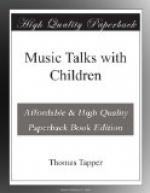And to repay us for the trouble of doing it we shall have greater and greater understanding of many things. Here they are:
I. Good thoughts and the proper writing of them make the classics.
II. Great thoughts, expressed
well, out of a great heart, make the
works which
last the longest.
III. Only they can appreciate the
classics who have something that
is classic
within them.
IV. Some love the classics
sooner and better than others because
they have
more power.
What shall these truths teach us? That true music cannot be learned rapidly; that the way of Art is long and difficult. But if the way is long, it is yet beautiful in every turn; if it is difficult, it is yet worth a struggle for what comes. As you read the lives of the great composers you will learn that they went willingly about their tasks, doing each one well. This is done by all great men. Great men take short steps carefully, no matter how rapidly they can go.
One of them [32] wrote: “Success comes with tiny steps.” And it comes entirely unsought. Besides all this we are to remember that the power for these things comes from
I. Thought-making;
II. Heart-learning;
III. Truth-seeking.
Now, just to end with let us read a few words from a book I trust we all may read some day: [33] “Great art is the expression of the mind of a great man, and mean art of a weak man.” Let us remember that in choosing things to play.
Further on Ruskin says: “If stone work is well put together, it means that a thoughtful man planned it, and a careful man cut it, and an honest man cemented it.” [34]
Likewise in these things one can see what is classic—work out of the heart and well done, and that comes from a thoughtful, careful, honest person.
CHAPTER IX.
WHAT WE SHOULD PLAY.
“But blessings do not fall in listless hands."_—Bayard Taylor._
We already begin to understand what the classics are. Year by year as our interest in the beautiful increases, we shall gain more definite knowledge about classic art. That which is classic will begin to announce itself in us. Our own choice indicates our taste but does not always indicate what is best for us. And one of the purposes of art is to improve the taste by setting before us the finest works; in these, by study, we find beauty with which we are unacquainted. Thus we enlarge our capacity for it.
Because we are born with taste unformed and untrained you can at once see the reason for gradually increasing the tasks. They are always a little more difficult—like going up a mountain—but they give a finer and finer view. The outlook from the mountain-top cannot be had all at once. We must work our way upward for it. Hence you will observe in your lessons that what was once a fitting task is no longer of quite the same value because of your increased power. But about this especially we shall have a Talk later on.




